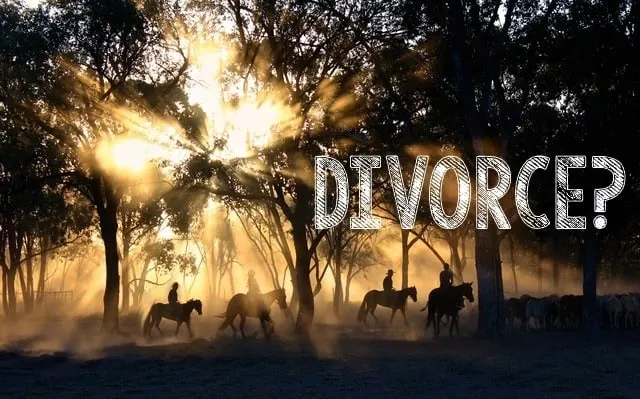My wife and I used to name call, yell, use profanity, and constantly criticize one another. Dr. John Gottman, the world’s leading marriage expert, calls refers to that behavior as Gottman’s Four Horsemen.
Dr. John Gottman’s Four Horsemen refer to the 4 worst things couples can do to one another which can lead to divorce. Those 4 horsemen are: Criticism, contempt, stonewalling, and defensiveness. Dr. Gottman has studied tens of thousands of couples for 40+ years and can predict divorce with 94% accuracy.
Since Dr. Gottman knows from his extensive study that these behaviors lead to divorce over 90% of the time, we knew we had to change.
Going back a decade, my wife and I did all of those things to the point where we drank too much, were miserable and I had an affair. But we found a better way.
So in this post, we’re examining each of the four horsemen, exactly why and how they are damaging, and what to do if you see one or more of them in your relationship.

What are the four horsemen in marriage?
Dr. Gottman’s Four Horsemen are simply what he describes as the 4 worst behaviors couples can do to one another.
He finds there to be no greater predictor of divorce or breakup than when couples resort to some or all of these 4 behavior and communication styles.
Let’s examine each one.
CRITICISM –
It’s OK to disagree with your spouse.
But not agreeing is different than actively criticizing them or their behavior. This kind of negative, absolute criticism becomes personal. You’re no longer disagreeing with a choice they made, you’re belittling them as a person.
An example would be when your partner has to work late and didn’t let you know. The criticizing way to handle it would be to say:
“Where the hell were you? You never bother to call us when you’re going to be late. You’re so selfish; you don’t care about us at all!”
The right way to handle it would be to say “I wasn’t sure what had happened and we waited on you for dinner.
I thought we had agreed we would let each other know if we weren’t coming home on time?”. This addresses the issue and how it impacted you but you aren’t criticizing them personally for their being insensitive.
In this example, you can easily see why criticism can so easily escalate the argument and over time could destroy the relationship.
I’m also guessing everyone reading this has behaved the negative way at least once in their life and understands the damage that can be done.
Questions are almost always better than statements.

CONTEMPT –
Contempt takes criticism further to where we actively mock, belittle or show genuine ugliness towards our partner.
When we show contempt for another we are saying (directly or indirectly) that we don’t value them as a person. That they don’t mean anything to us.
An example of this would be how the late spouse in the above story might respond to the critical reception they received when they got home.
“Well some of us have to work all day and don’t just get to sit around getting fat and watching TV all day. Some of us are busy doing important things for this family, but you wouldn’t know or care about stuff like that, would you, you lazy $%FD#@&!”
Again, it’s easy to see why this is a terrible way to treat anyone, especially someone you claim to love. But it’s also easy to see how communication can escalate in the heat of the moment when we fall into Gottman’s four horsemen.

DEFENSIVENESS –
Being defensive is something that happens to all of us.
Sometimes we get defensive when we are genuinely accused unfairly. More often, however, it’s something we fall into when we didn’t do something we were supposed to and we feel guilty. We make excuses. Or we shift the blame onto someone else.
The worst is when we take responsibility at first but then we add that dreaded word “but”.
“I was going to call and let you know I was going to be late, but you never bother to pick up the phone when I call anyway”.
In this example, the partner owns it at first but then shifts the blame onto the other spouse even though it’s completely unfair.
When we don’t truly own our mistakes:
a. We don’t learn from our mistakes
b. Our spouse will think less of us since they know we messed up
The right way for the late spouse to respond, even if met with criticism initially would be:
“I’m so sorry honey. You have every right to be mad. I know I sometimes make a habit of not calling and it’s very disrespectful to you to leave you wondering. I’m going to make a concerted effort to be more sensitive to how my actions affect you moving forward. I promise”
Even if the other spouse was critical, to begin with, a response like that can totally diffuse the situation. The key then is simply to stick by the promise.
If you do this 3 times a week and respond like that, after a while it will be meaningless. It will be obvious you’re just paying lip service to your partner.
Own your mistakes 100%!
STONEWALLING –
Stonewalling, the last of Gottman’s four horsemen is when one partner simply refuses to take part in the argument.
They shut down and don’t participate in the conversation. The classic “silent treatment (click to read my detailed post on this)“.
Now if the conversation started off with criticism, contempt, and defensiveness they may need some time to calm down.
But true stonewalling has no place in a healthy relationship.
Pretending the issue isn’t there, making up excuses why now isn’t a good time to talk or physically leaving don’t help resolve the issue. And make no mistake, issues don’t just heal themselves.
Both parties have to take an active role in fixing them.
If you need a moment in the heat of the argument, ask for a moment. But understand that it is temporary and that actively participating will be necessary. Not stonewalling also helps your partner recognize that you value them and value finding a solution to the disagreement.
Couples wishing to divorce in the UK no longer have to allocate blame or mutually agree to end their marriages, justice secretary David Gauke announced in March: 8/20 signs of progress from 2019 so far #WhatWentRight https://t.co/9zjSWUrGpH pic.twitter.com/qDIQqFFGji
— PositiveNewsUK (@PositiveNewsUK) July 5, 2019
What are the predictors of divorce?
Gottman acknowledges that couples will disagree.
But in his over 40 years of studying literally thousands of couples of all races, ages, socio-economic factors as well as looking at same-sex couples, he has found some undeniable characteristics of the things that couples sometimes do which destroy the relationship.
In the heat of battle, do you resort to any of the following?
- Name-calling
- Profanity
- Insults
- Belittling or critical behavior
- Saying mean things just to get a rise out of your partner
If you answered yes to 1 or more of those, they could definitely be a sign your marriage is headed for divorce. The good news is, by reading this article, you understand that something needs to change.
Gottman’s four horsemen are, of course, named after the Biblical story of the four horsemen of the apocalypse in terms of how devastating the behaviors can be.
A cornerstone of health communication between spouses (or really anyone), is listening. If you struggle with really Listening with Empathy (click to read on my site), as I did, I highly recommend you take a moment and check out my highly shared post on that subject.
Trust me; waiting your turn to talk is NOT really listening.
What is the Gottman Method?
Dr. John Gottman and his wife Dr. Julie Gottman, of the Gottman Institute, have been doing in-depth studies of couples for over 40 years.
Literally, no one has done more clinical research on relationships & divorce than the Gottmans. If there is 1 marriage and relationship expert you should follow it should be Dr. John Gottman.
Between the two of them, the Gottmans have won countless awards and Dr. John Gottman was also named “Top 10 Most Influential Therapists of the past 25 years” by the Psychotherapy Networker.
The Gottman Method is a unique way of doing couples counseling that includes a complete assessment of the couple’s relationship. It also uses something called the Sound Relationship House Theory.
The Sound Relationship House Theory is simply a way of using building blocks to rebuild the marriage in a healthy way and includes the following steps:
- Build Love Maps (to increase your awareness of each other)
- Share Fondness and Admiration (focus on appreciation instead of expectation)
- Turn Towards Instead of Away (don’t run away when it gets hard)
- The Positive Perspective (be your spouse’s best friend)
- Manage Conflict
- Accept influence from your partner: really listen to them!
- Discuss your problems: talk about struggles, challenges, and feelings
- Practice self-soothing: stay calm during hard discussions
- Make Life Dreams Come True (create shared goals and dreams and support each other in getting there)
- Create Shared Meaning (have a defined sense of purpose for your life, both individually and together)
Many counselors have gone through Dr. Gottman’s training programs and workshops, so look for the Gottman name to be mentioned on therapist’s websites and in their offices to be certain they practice the Gottman Method.
Gottman’s book, The Seven Principles for Making Marriage Work (click HERE to read my review) may literally have saved my marriage.
I know without a doubt that if you and/or your spouse struggle with any of Gottman’s four horsemen, this book can save your relationship too.
You just have to acknowledge the problem and be willing to work on it.
Why you must avoid Gottman’s four horsemen in your relationship at all costs!

All couples argue. Every couple has fights and disagreements.
If you are looking for that magic relationship with no tension whatsoever you’ll either never find it or you’ll also find it devoid of passion.
The trick is to avoid Gottman’s four horsemen when communicating with one another. A healthy relationship understands there will be differences of opinion. But with understanding, also comes respect.
I know my wife does things differently.
While I do the majority of the grocery shopping in our house she occasionally does it with me or alone. She goes in armed primarily with gut instinct. I, on the other hand, scour the house to see what we need and write a detailed list broken down by the department.
Personally, I like my style better and I feel like I come away spending less because I don’t occasionally buy things we have plenty of and I don’t get much that’s not on my list.
Now if every time she went shopping I was critical of her method. If I called her names or made her feel inferior or dumb I would be showing both criticisms as well as contempt for her.
I would be showing her a complete lack of respect and belittling her as a person. Those are all horrible things to do to someone you love and repeatedly over time can easily replace her love for me with hate.
Now I’m not here to claim to be a superior being. In the early years of our marriage, both my wife and I were guilty of all of Gottman’s four horsemen.
Even today, while we rarely show criticism or contempt, we do sometimes struggle with defensiveness or stonewalling. It’s a work in progress.
But if we are aware both of our behavior as well as the potential damage we are causing, that’s half the battle.
No matter what you struggle with; drugs, alcohol, or other addictions, being aware and admitting you have a problem is halfway to fixing the issue.
The 4 Horsemen:
1 Criticism
2 Contempt
3 Defensiveness
4 Stonewalling~John Gottman pic.twitter.com/TKInbQMGaI
— Michael A. Kaplan (@mkaplanPMP) February 23, 2015
Are the four horsemen of divorce headed your way?
Gottman’s four horsemen have led Dr. Gottman to be able to achieve an almost 94% accuracy in determining couples who will later divorce.
He has completed 7 studies over his 40 years of research looking at couples at the beginning, middle and in some cases end of their relationships. If you want to avoid divorce, learning how to remove Gottman’s four horsemen from your relationship is crucial!
Check out Dr. Gottman interviewed on the Anderson Cooper show where they show detailed examples of Gottman’s four horsemen as well as how it can predict divorce.
If you feel like your relationship is headed for a split or your marriage headed for divorce, I highly recommend you take a moment and check out one of my most viewed articles about the Top Reasons for Divorce (click to read my article) (and How You Can Avoid Them).
I break down the big reasons couples split up and dissect easy, actionable steps you can take to correct those issues.
The crucial steps you must take to save your marriage!
First and foremost we need to remove absolutes when speaking to one another.
Avoid using words and phrases like “You always” or “you never”. No one always or never does anything 100% of the time.
Another step to take is simply to apply the golden rule to every conversation you have. Speak and treat everyone the way you want to be spoken to and treated.
That sounds simple but it works every time.
We can’t control anyone else’s actions but you can ALWAYS control your actions and reactions. It just takes effort, awareness, and focus. But if you value your relationship, then identifying the negative things in our behavior and taking steps to correct them is crucial!
You can have the marriage or relationship of your dreams and little simple changes in how you communicate with your spouse or partner can make all the difference!
Have Gottman’s Four Horsemen showed up in your relationship?
In this post, we took an in-depth look into the world of John Gottman and his 40+ years of studying couples and relationship patterns.
We looked at the 4 worst things couples can do to each other to damage and destroy the relationship. But more importantly, we looked at some proven solutions for finding solutions when you or your spouse find yourself engaging in these behaviors.
Specifically, we explored John Gottman’s four horsemen and their devastating effects so you can take your relationship to the next level.
Photo credits (that aren’t mine or which require attribution:
couple yelling at each other VicBy: Vic is licensed under CC BY 2.0
Drained of all purpose Leland FranciscoBy: Leland Francisco is licensed under CC BY 2.0
- Sagittarius Man & Gemini Woman Love and Sex Compatibility - January 31, 2024
- Taurus Ascendant Rising Personality Traits in Men (Guide) - January 31, 2024
- How to Seduce and Attract a Sagittarius Man (Seduction Tips) - January 31, 2024
